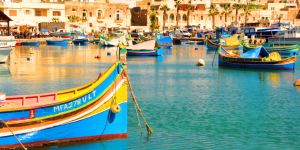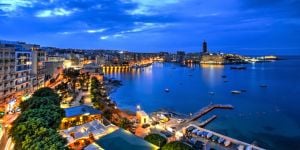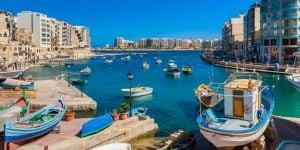
Many young foreigners choose Malta for their higher education. The Republic enjoys a strong reputation for its quality academic system. Whether you're looking to study abroad for a short period or earn an additional degree, Malta offers an ideal setting for a new academic adventure. With its rich history, laid-back lifestyle, and supportive learning environment, the country is an appealing destination for international students.
The higher education system in Malta
Since Malta is a member of the European Union, its higher education aligns with the Bologna Process, which has harmonized the educational systems of European universities. Consequently, higher education in Malta is divided into three cycles:
- The first cycle: Bachelor's degrees typically last 3 years;
- Master's cycle: Master's degrees generally take two years;
- Doctoral cycle: A doctorate takes at least three years, often longer.
Students in Malta earn ECTS credits (European Credit Transfer System) recognized by universities in other EU countries. Besides the university, Malta also has other higher education institutions.
Procedures and visas for studying in Malta
Language is the first important point to consider when moving to Malta. The country has two official languages, namely Maltese and English. The latter is used for higher education. Therefore, it is essential to speak English to study in Malta. Overall, moving to Malta to study requires good organization.
Procedures for Europeans
The procedures are relatively simple for Europeans, i.e., EU, EEA, and Swiss nationals, who do not need a visa to enter Malta. They only need to present a valid passport. However, for any stay exceeding 90 days (3 months) in Malta, they must apply for a residence permit (eResidence card).
Here is a non-exhaustive list of documents to gather and present to apply for their residence permit in Malta:
- Your valid passport or identity card with a photocopy;
- The acceptance letter from the educational institution;
- A health insurance covering hospitalization and repatriation;
- A proof of means or financial support;
- A completed and signed residence permit application form for studies (form M);
- A completed and signed GDPR form.
Since the authorities have a large number of similar files to process, it is advisable to submit your application as soon as possible, even before traveling to Malta.
Procedures for third-country nationals
Third-country nationals must inquire at the nearest Maltese embassy to their place of residence to know the conditions that must be met before departure. These conditions may vary depending on your country and bilateral agreements. Do not hesitate to contact the Student Advisory Services (SAS) at the University of Malta (UM). You can also check the list of partner universities of the University of Malta for an international exchange program.
Third-country nationals generally need a visa to enter Malta. However, there are two types of Maltese visas, to be selected based on the duration of the stay:
- The short-stay visa (visa Schengen type C - 90 days within a 180-day period);
- The long-stay visa (visa Schengen type D).
International students usually stay for at least one year in Malta, so D visa is the most logical choice.
Plan your trip carefully because, for example, you may not find direct flights between your country of residence and Malta, requiring a stopover during your journey. If this is the case, check with the embassy of the stopover country if you need an entry or transit visa.
Once in Malta, you will need to apply for an eResidence permit. The University of Malta website provides a detailed overview of the conditions to be met by EU/EEA nationals and third-country nationals to obtain their eResidence.
Good to know:
Malta is also home to several private schools and specialized faculties. You can find the list further in this article.
Studying at the University of Malta
The University of Malta is the highest institution of learning in Malta. It welcomes about 11,500 new students each year, including around 1,700 foreigners from over 100 countries, offering full-time and part-time courses.
The University of Malta has 16 institutes, 13 centers, 3 schools, and 14 faculties, including the following: arts, built environment, dental surgery, economics, management and accountancy, education, engineering, health sciences, information and communication technology, law, media and knowledge sciences, medicine and surgery, sciences, social well-being, and theology.
It has 4 campuses:
- The main campus, located in the center of Msida;
- The Valletta campus, which hosts the international collaboration program (among other events and groups);
- The Marsaxlokk campus, home to the solar research laboratory of the university's Institute for Sustainable Energy;
- The Gozo campus, which offers part-time evening courses leading to a diploma.
University courses are organized by semester, from October to February and from February to June or July. Students are entitled to two weeks of vacation in December and in March or April (for Easter).
The Erasmus+ program, the renowned EU program aimed at supporting education, training, youth, and sport in Europe, is highly appreciated in Malta. It is open to both EU and non-European students. If you are not an EU citizen, check if you can benefit from the Erasmus Mundus program.
Good to know:
Since knowledge of English is required, the university offers "English For Visiting Students at University of Malta", a preparatory course at the language school.
Enrollment at the University of Malta
The admissions and records office differentiates between Maltese and international students when evaluating applications. Students with the qualifications to enter a recognized university with standards equivalent to those of the University of Malta (UM) in their home country are generally accepted.
UM accepts candidates wishing to study full-time, but also part-time, in evening classes and online (under certain conditions).
Let's recall that the University of Malta is open to international students holding a baccalaureate or its equivalent. Before enrolling, you can inquire through the following means:
International Office
University of Malta Msida MSD 2080 MALTA
Contact: www.um.edu.mt/international/students
Or
International Admissions Office
University of Malta Msida MSD 2080 MALTA
Tel.: 356 2340 2225
Contact: www.um.edu.mt/contact/intadmissions
Or via ERASMUS
International and EU Office
University of Malta Msida MSD 2080 MALTA
Contact: www.um.edu.mt/contact/international
To submit your application, you can contact the International & EU office or apply online, on the University of Malta's website. Applications must be submitted before the indicated deadline. Among the documents to be provided are proof of finances and proof of English proficiency.
Tuition fees at the University of Malta
Besides travel and accommodation expenses, consider the university fees, whose amounts vary based on several criteria: the type of course, the duration of the program, and the students' citizenship (EU/EEA or third-country national). The enrollment fees at the University of Malta are generally affordable, and for candidates with foreign degrees, they amount to €95 and increase to €150 for late applications (for courses that accept such applications).
University fees vary depending on the programs, which range from three terms in the faculty of arts to 4 or 5 years in some fields like technology or engineering. Two examples:
- In 2025, undergraduate arts programs are free for Maltese/EU/EEA candidates and charged at €8,500 for other students.
- For an undergraduate science program, tuition fees amount to €10,800 for non-EU and non-EEA candidates, while local, EU, and EEA students do not have to pay tuition fees.
It is possible to study in Malta for a short period, ranging from one semester to an academic year. In this case:
- Students are considered "visitors" if there is no bilateral exchange agreement between the University of Malta and their home university;
- They must register for study units at the University of Malta based on tuition fees.
However, if their university has an exchange agreement with the University of Malta, they are considered exchange students. In this case, they must have been selected by their home university to send their application to UM. Note, the costs are high, ranging from €900 to €5,400 for a semester.
For study funding, you can go through the Erasmus+ program to obtain a scholarship. Other scholarships are also available, but you need to inquire with the relevant services or organizations in each region. Moreover, some scholarships may be awarded based on the country and the field of study.
Other universities, schools, and faculties in Malta
Although the University of Malta is the only public university in the country, many other universities and private schools might interest you.
- The MCAST (Malta College of Arts, Science and Technology) is Malta's most comprehensive school with a number of departments ranging from business to maritime studies through arts and technology.
- The American University of Malta is a private American-style university located in Bormla (Cospicua).
- The Institute of Tourism Studies specializes in degrees related to tourism and hospitality.
Among other private higher education institutions, there are:
- Eurocentres (language school);
- Transcontinental Institution of Higher Education (advanced business study programs);
- STC Higher Education (IT and business courses);
- Learnkey Training Institute (English, business administration, IT, engineering, health and social services, tourism and hospitality, etc.);
- United Campus of Malta;
- AM Language;
- Gateway School of English;
- EEC-ITIS Malta Tourism and Languages Institute;
- The London School of Commerce Malta;
- Clubclass English Language School;
- Queen Mary University of Medicine and Dentistry;
- Malta Lingua.
Student life in Malta
Student life in Malta is indeed very enjoyable with its Mediterranean climate promising more than 300 days of sunshine per year. Students love to go to the beaches during their free time or, for history lovers, to the megalithic temples, baroque churches, and fortified cities built by the knights!
In fact, Malta is the ideal destination to enjoy student life. The University of Malta, as well as other faculties and schools, are located near Sliema and Saint Julian's. These two cities are renowned for their many restaurants, bars, and cafes. In Saint Julian's, you will find Paceville, the center of Malta's nightlife.
Malta is strategically located in the heart of the Mediterranean Sea, between Sicily and Tunisia. From its international airport, you can take one of the many low-cost flights available to a wide range of destinations.
Malta allows students to travel and explore Europe during their vacations, a good point for those coming from outside the European Union. Indeed, their Maltese visa and eResidence card allow them to travel freely within the Schengen area!
Regarding accommodation, it is possible to rent a room in a university residence, located just over 3 km from the university campus. A free bus service connecting the residence to the university runs regularly, along with a security, laundry, and catering service.
Important:
The rent for rooms in university residences varies depending on the type of room.
While the University of Malta provides housing for a number of students, it is quite easy to find accommodation in Malta. Rents are not very high, and you will certainly enjoy sharing a house near the sea with other students! Expect to pay between 250 and 700 euros per month for shared accommodation and around 250 euros for food.
Wherever you have chosen to live, you will find all amenities nearby: grocery stores, pharmacies, shops, buses, etc. Also note that Malta's public hospital, Mater Dei, is located next to the university.
Finally, consider contacting the student associations and societies in Malta. Some are open to all students, while others specialize in a discipline. Among the student associations in Malta are the European Law Students' Association (ELSA) Malta, Erasmus Student Network (ESN) Malta, and JEF (Young European Federalists). They often organize events that are a great opportunity to socialize and make new friends.
Useful links:
Government of Malta - University of Malta
University of Malta - Future Students
Malta Further and Higher Education Authority (MFHEA) - List of Higher Education Institutions
We do our best to provide accurate and up to date information. However, if you have noticed any inaccuracies in this article, please let us know in the comments section below.








